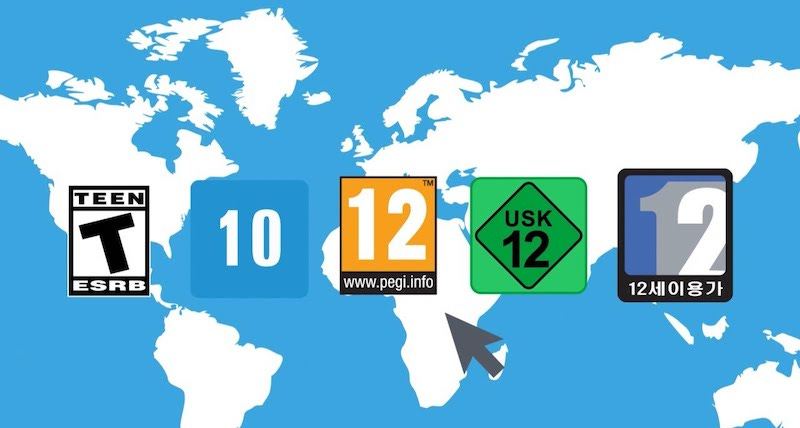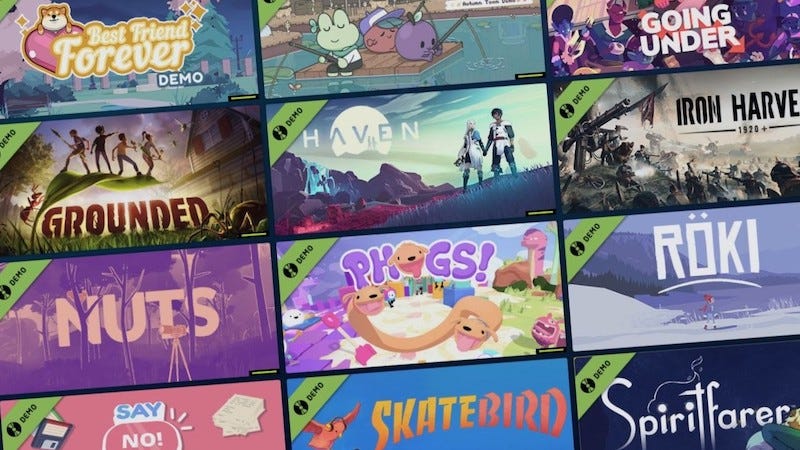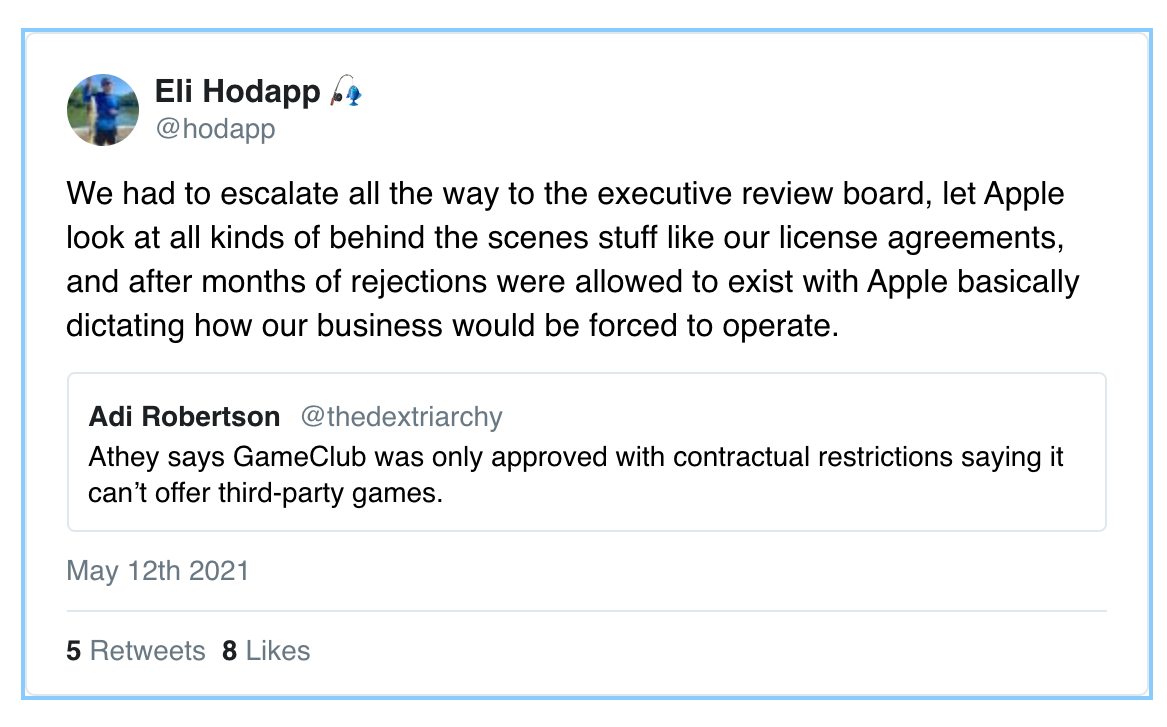The one game rating problem you really don't want to have
Publikováno: 12.5.2021
..and how to avoid it. Possibly. Hopefully!
[The GameDiscoverCo game discovery newsletter is written by ‘how people find your game’ expert & GameDiscoverCo founder Simon Carless, and is a regular look at how people discover and buy video games in the 2020s.]
We’re back in the place, with you, and with everybody. (Everybody in the place, let’s go!) And welcome to a world where the Epic-Apple lawsuit is still whispering urgently to you in the background - Superjoost has a great strategy-level overview. But we do actually need to talk about other things too.
So we’re leading off this newsletter with a granular issue that has come up a few times now - and needs more boosting. And it’s about video game ratings.
IARC’s great - but one big issue you want to avoid.
We’d had this on the list to discuss for a while, but The Colonists being the latest game to get pulled from Switch for age ratings issues allows us to talk about it more directly. There was also Megabyte Punch’s experience from 2020, as well as SmileBasic 4 and Jamestown, to give just a few examples. I personally know at least three other devs who had this issue in recent months.
Basically: IARC, the global age rating system for digital games, is an amazing way to get your titles approved. It’s made things so much easier when it comes to getting ratings simultaneously approved - for free, it used to cost money - across a number of global industry-run or government-linked national ratings boards (PEGI, ESRB, etc, etc.)
(BTW, the excellent Digital Antiquarian game history blog is just talking about the original set-up of the ESRB in 1993, for those interested in the history of ratings.)
Anyhow, submitting to IARC involves self-rating your own games. And it’s sometimes difficult to gauge how harsh you should be - devs and publishers will tend to drift towards lower ratings for their games, or perhaps forget a certain very specific scene/graphic is in it.
The problem: if IARC does a spot check on the game after release and finds something that bumps the age rating ‘significantly’, or if you get a different rating when you submit the game to another store? Then your IARC rating may become invalid until successful resubmission.
Some participating storefronts are relatively relaxed about what happens while you resubmit. But Nintendo - a particularly family-friendly company - will often remove your game from the store across Europe (in particular) or North America while you get it fixed. (And you have to pass Nintendo lotcheck again when resubmitting, so it can take a couple of weeks.)
In fact, Thomas Whitehead just did a lengthy & useful article on this IARC issue over at NintendoLife, and makes a great point: “With text-heavy games, in particular, it's worth going through scripts carefully. My approach to age ratings was typically to overstate, go slightly higher if necessary rather than shoot low, so that sudden de-listings didn't happen.”
But having dug into this more, it seems there are a few gotchas here. You only need to go up two ‘rating notches’ on any of the constituent rating agencies that opt into IARC to require re-rating. And some government ratings agencies - particularly Russia, apparently, but also Australia and others - can be very sensitive to even individual scenes.
Just reading Russia’s government rules, it appears you can jump from a 6+ to a 16+ rating just for having a single uncaught “image or description of an accident, catastrophe, illness, death without a naturalistic display of their consequences, which can cause fear, horror or panic in children.” Or even a background depiction of alcohol that was missed.
And we’ve also heard stories of devs getting radically different ratings for the same product from different regional ratings boards. This is a natural part of having many different stakeholders that IARC is trying to wrangle. And the IARC is still doing sterling - and largely unappreciated work. So thank you!
But this loophole can definitely mess with your game’s launch. So keep an eye on it and be slightly harsh on your own games. In the meantime, we’ll ask IARC if they think the process can be improved in any way…
A (strong) argument for leaving your demo up forever?
We were very interested to read Chris Zukowski’s latest blog post, ‘Keep your free Steam demo up forever!’, because it has a very specific point of view that we did not agree with when we last talked about demos and prologues of your Steam game.
In our defence, we did show a recent example (The Riftbreaker) of a game expanding its discoverability via a continued demo/Prologue. So I chatted to Chris via DM about his piece, and I’m starting to think that he may be right.
Chris’ view is simply “we must maximize the exposure of that demo by leaving it up. It increases the odds someone will discover you.” While I’ve been a ‘time-limited public demo’ fan, the biggest argument against them is this: if you time-limit your demo during the time that everyone ELSE is doing that - which is often Steam NextFest aka Festivals - then you’re competing for streamer and player attention with hundreds of other games.
So why not make them more widely available afterwards? Sure, you can also do private alphas and betas to get useful player feedback. That’s the other possibility, and allows you to test rougher versions of the game. (You can’t have a fear of people playing early versions of your game, though - that way lies perfectionism & lack of improvement!)
But public demos - especially for smaller studios - are a great way to gauge interest as you keep making the game. Just don’t give away too much of the title, and spend some time thinking about making a brief, replayable fun slice of your game! The nature of the demo is vital.
Then, if your demo isn’t catching fire, it may be an unsolvable problem around game hook, or it may be a semi-solvable problem around gameplay. Or ‘not the kind of game that a brief demo works with’, I guess. But it’s great to know sooner, rather than later?
Of course, I’m aware that constant public demo availability plays havoc with traditional game marketing schedules and reveals. So it may or may not work for everyone. But Chris has me more convinced that the right demo can stay up for the entire cycle. So.. consider it?
The game discovery news round-up..
So, this is the last of the free GameDiscoverCo newsletters for this week. We’re planning some interesting features for next week, including a return to ‘the other 50%’ of Steam games, sales-wise, if you remember our last foray there. So watch out for that, and read on for the link round-up.
Also: don’t forget you can get access to our Plus-member only Discord (cool peers to talk to!), pre-release Steam data, and exclusive Friday game analysis via our GameDiscoverCo Plus paid membership. We’d love to have you, and every new Plus subscription allows us to keep making this free newsletter possible:
You’re probably keeping up on this, but just wanted to flag Sony saying that PlayStation 5 hardware shortages may continue into 2022. Sony “struggled with production due to a semiconductor chip shortage that's impacted everything from consoles to cars”, and the PS5 is a complex beast compared to say, Switch. So even though PS5-tuned games like Returnal are getting great buzz, you might want to grab some Sony funding if you want to solely exercise the PS5 hardware.
We’re always fans of ‘here is how you do things!’ instructional blogs, and Michael Wagner’s Gamasutra blog about your Steam store page is a useful one. He also goes into things like capsule image styling and even logo design (“logos greatly affect consumer behavior and performance”) that we tend to feel non-qualified to weigh in on - being what we like to flippantly describe as ‘art direction neutral’.
The future of privacy and ad tracking - important for monetizing many free to play games - is still in flux, with Apple’s new app privacy tracking still rolling out. And some recent numbers show “only 13% of global iOS users have allowed apps to track by the second week of the feature being enabled.” And apparently only 5% in the U.S.? So this continues to portend tectonic shifts in the mobile market.
Have been chatting via email to some of the University Of Alberta authors of this research paper on improving discoverability for indie games - you can now read the PDF here. And it’s good to see the academic world getting interested in such thorny problems! A lot of surveying of Itch and Steam indie devs was done, and I was tickled by one dev suggestion: “Also recommend the indie games that are the least similar to showcase their uniqueness.” Has anyone done this? They totally should…
You can make premium PC/console games from anywhere in the world. Which is why we find it fascinating to track the regional salaries exposed in the #gamedevpaidme Twitter hashtag, which got re-started again recently. You’ll notice big differences - sometimes tracking to ‘cost of living’ differences, sometimes not - between the U.S., Canada, the UK, and the rest of Europe. Worth perusing.
Harnessing the power of streamers is something we talk about a lot at GameDiscoverCo. So it’s interesting to see a company called Dare Drop trying to “…create dares for streamers to complete with exciting rewards like game keys, swag, concept art, or in game loot.” As an example, BoneyC had to speedrun Super Cable Boy in under an hour, and when he did so, it unlocked free game keys for his viewers. Intriguing, huh?
Microlinks: May’s Xbox OS update includes improvements for ‘quick resume’ mode, plus an easier way to see trailers for Game Pass games; Among Us’ Victoria Tran has updated her ‘resources for learning about building game communities’ page - love it, since it features a lot of GDC talks I was involved in helping to program, haha; this ‘facts about GOG’ page is fairly new, and it’s interesting to see # of games on the PC platform - ‘only’ 483 published in 2020.
Finally, I had an Epic/Apple lawsuit-related Tweet from GameClub VP of biz dev Eli Hodapp stored in my newsletter drafts ready to go. And then I clicked on it to discover that… he’d deleted it.
Sorry to preserve it, Eli, but I really like his firm’s mobile game subscription service GameClub, particularly because it resurrects old iOS games that hadn’t been updated for 64-bit. (Now I realize this may be the only way they can make the biz model work, due to Apple’s restrictions!)
Anyhow, his frustrated comment illustrates what he clearly sees as a ‘fairness’ issue around Apple owning Apple Arcade, and not permitting similar services on their platform. YMMV, but questions like this are at the heart of the Epic/Apple trial:
[We’re GameDiscoverCo, a new agency based around one simple issue: how do players find, buy and enjoy your premium PC or console game? You can subscribe to GameDiscoverCo Plus to get access to exclusive newsletters, interactive daily rankings of every unreleased Steam game, and lots more besides.]


